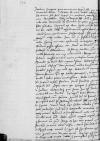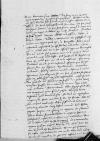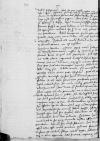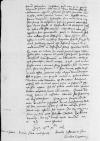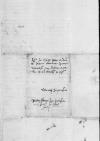List #2413
Cornelis DE SCHEPPER do Ioannes DANTISCUSBinche, 1541-04-12
Regest polski:
Dantiscus' letter of 10 September 1540 was handed to De Schepper by Eustathius Knobelsdorf. De Schepper excuses himself against Dantiscus complaint about the lack of letters.
His last letter [IDL 2334] from Vienna was first entrusted to Wolfgang Prantner, and then to Sigismund von Herberstein, who, after Prantner had an accident, replaced him as envoy to the Polish King. Since the letter was repeatedly sent without success, De Schepper asks to acknowledge receipt of it. De Schepper announces the death of old friends of Dnatiscus: Marcus Laurijn, Adolf of Burgundy, Jacob Snaggaert and others.
After his letter from Vienna De Schepper was unable to write again, because of his departure for Transylvania in April, he thought Dantiscus was aware of this. Anyway no rumour of Danticus' death has circulated recently. In August De Schepper returned from Vienna to the imperial court in Brussels. When [Nicolas Perrenot de] Granvelle and the Emperor left for the Diet in Worms, De Schepper was instructed to stay with the governess of the Netherlands. He welcomes this development, because he wants to withdraw from the court. For this purpose he bought the lordship of Eeke. He wants to move the manor there from Bruges. He gives an enthusiastic description of his new domain. For the time being his obligations at court prevent him to settle in Eeke but he prepares his departure. With some bitterness he notes that there are plenty of talented and successful persons who can step in his place. He wants to follow the example of Carondelet, who has retired from his functions. Although he is still physically and mentally fit to undertake difficult assignments he feels so disappointed that he longs to dedicate his time to the reading of the holy texts. Godschalck Ericksen has been sent to Hungary to watch over the interests of Queen Mary. He himself will always put the interest of the state above his personal interests but he doubts about his ability to deal with the current international situation. However, he is convinced that a possible succes of Lasky's Turkish embassy would be partially due to him, and that he achieved good results in the Hungarian affairs.
Odpowiedź Dantyszka na „epigramat wenecki” spodobała się w otoczeniu De Scheppera, pokazał ją także królowej Marii. Z samym epigramatem De Schepper zapoznał się już w czerwcu w Eger – przysłał go tamtejszemu biskupowi [Franjo Frankopanowi] Seweryn Boner.
De Schepper przekazuje nowiny: Między cesarzem a królem Francji panuje wprawdzie rozejm, ale nie zgoda. Rozwój sytuacji zależy od postanowień Sejmu Rzeszy, a co za tym idzie, od spokoju w Niemczech. Turcy są tuż przy granicy. We Francji nie ma wojsk cesarskich. W wyniku konfliktu pomiędzy konetablem [Anne de Montmorency] a admirałem [Philippe de Chabot], w lutym [1541] admirał został skazany na dożywotnie więzienie, pozbawienie urzędów i konfiskatę majątku, jednak dzięki kobiecym zabiegom [kochanki króla Anne de Pisseleu d’Heilly] powrócił do łask króla Francji. W Anglii panuje pokój, nie licząc drobnych potyczek z Francuzami koło Calais oraz zbrojeń przeciwko Szkocji, gdzie schronili sie wygnani angielscy duchowni. W stosunku do Niderlandów Anglia wprowadziła obostrzenia co do handlu i żeglugi. Anna Kliwijska mieszka swobodnie w Anglii, po tym jak została odesłana przez króla Henryka VIII. Na sejm w Ratyzbonie ma przybyć poselstwo duńskie. Księstwo Geldrii odmawia wydalenia księcia Jülich [Wilhelma V Der Reiche], pomimo ze cesarz posłał tam swojego herolda Lievena Algoeta. W Westfalii i Hesji ukrywają sie rozproszeni żołnierze z Geldrii. Następcą zmarłego pana Beveren [Adolfa of Burgundy] na funkcji admirała został jego syn [Maximilian II of Burgundy]. Ma on poślubić córkę księcia Aarschot [Louise de Croÿ]. Syn hrabiego Henryka [of Nassau], książę Orleanu [René de Châlon] poślubił córkę księcia Lotaryngii [Anne of Lorraine], która jest w ciąży. Spośród znajomych Dantyszka cesarzowi służą nadal [Nicolas Perrenot] de Granvelle i [Louis of Flanders] Lord of Praet.
De Schepper dziękuje Dantyszkowi za przesłane piwo. Informuje o swojej opiece nad poleconym mu przez Dantyszka młodzieńcem [Eustachym Knobelsdorfem]: studiuje on prawo i jest utalentowanym poetą. Zainspirowany listem Sigmunda von Herberstaina, De Schepper omawia sytuację wschodniego pogranicza Królestwa Polskiego. Nie spodziewa się powierzenia mu poselstwa do Polski z okazji zaślubin młodego króla [Zygmunt II August], zazwyczaj zlecane mu są bowiem bardziej niebezpieczne misje. Nie ma też ochoty na kontakt z nikim w Polsce prócz Dantyszka, po tym, jak został on niesprawiedliwie potraktowany przez władcę. Zapewnia o swoim oddaniu i pozdrawia braci i siostry Dantyszka.
| odebrano Heilsberg (Lidzbark), 1541-07-08 Rękopiśmienne podstawy źródłowe:
Publikacje:
| ||||||||||||||||
Tekst + aparat krytyczny + komentarz Zwykły tekst Tekst + komentarz Tekst + aparat krytyczny Ekscerpty dotyczące podróży Dantyszka
Reverendissimo in Christo Patri et Domino, domino
Zum
Reverendissime Praesul, domine et pater ex animo honorandissime et observandissime.
Praemissa humili oblatione obsequiorum meorum.
Nihil iucundius mihi afferre potuit ornatissimus iuvenis
Scripsi ad te ex
Scribis in cf.
Ut vero de meis rebus aliquid audi[as]: ex
Sed hactenus ibi degere non licuit, quod nondum potui me ab aula absolvere, paro tamen commoditates abeundi, quas eo facilius assequar, quo longe plurimi sunt, qui ingenia excellentiora, maiorem eruditionem gratiamque rebus in omnibus, afferunt in medium aestimatione, quae aliquanta de me fuit, cotidie senescente, quod neque praeter spem, neque praeter exspectationem mihi usuvenit. Tam incommode enim versatusne ego fuissem in studiis litterarum, versatus fuissem tot in actionibus, ut nova haec videri mihi deberent?
De me quid futurum sit, nescio, sed condicionem non ambio ullam aliam, nisi ex commodo esset reipublicae. Cui privatos affectus meos haud
dubie postponerem, sed in quo posset opera mea esse usui, cum praesertim summa rerum, de qua agitur, summis et extremis sit viribus defendenda, in quas, rogo, quid ego conferre possem? Satis habeo compertum, si
Epigramma Venetum videram
Quae inter duos orbis
In
Idem
In locum defuncti
Apud
Cerevisia tua fuit admodum sapida. Inveni enim ex
Consilium serenissimorum
Quod cupis me videre in nuptiis
Quae per me scripta esse tibi volui, ut abicias suspicionem de me negligentiae. Nulla enim dies, ne mors quidem, si modo Deo ita visum fuerit, adimet mihi affectum filii erga te. Ita teque meque conservet, qui solus potest, salvator
Ex
Eiusdem Reverendissimae Paternitatis Vestrae humilis inservitor et filius
Postscript:
[1 ] In September 1541, Herberstein was sent by King Ferdinand I on a mission to the Polish Kings. He first travelled from Vienna to Cracow, and, then from there to Vilnius, as Sigismund I resided there with Queen Bona Sforza and Sigismund II August from May 1540 until May 1542. (cf. cf.
[2 ] Herberstein stayed in Vilnius from ca. 26 September to 5 October 1540. Cf. cf. Ioannes Dantiscus' correspondence with Sigmund von Herberstein, ed. by Marek A. Janicki, Tomasz Ososiński, Warsaw-Cracow, OBTA UW - PAU, 2008, series: Corpus Epistularum Ioannis Dantisci 2, Amicorum sermones mutui 1, series ed.(s): Jerzy Axer, Anna Skolimowska ⌊CEID 2/1cf. Ioannes Dantiscus' correspondence with Sigmund von Herberstein, ed. by Marek A. Janicki, Tomasz Ososiński, Warsaw-Cracow, OBTA UW - PAU, 2008, series: Corpus Epistularum Ioannis Dantisci 2, Amicorum sermones mutui 1, series ed.(s): Jerzy Axer, Anna Skolimowska ⌋ p. 155, note 5
[3 ] On the fate of this letter by De Schepper (cf.
[4 ] Dantiscus received De Schepper’s letter of 8 August 1540 on 5 October 1540 in Graudenz. At De Schepper’s request he confirms the receipt in his letter of 15 July, 1541 (cf.
[5 ] In the Bruges Archives a deed from 1540 is preserved, in which Jacob Snaggaert, burgher of Bruges, makes arrangements regarding his inheritance for the benefit of the children of Ysabeau Donche with Pierre Laurijn and Cornille Scepperus; cf. Het Rijksarchief in Belgie, Archief van de Familie De Baenst, BE-A0513_107047_105136_DUT, No. 76 (URL: http://search.arch.be/ead/BE-A0513_107047_105136_DUT, consulted 20150411).
[6 ] The „Wormser Religionsgespräch” (colloquium of Worms) of 1541. This was the continuation of the „Hagenauer Religionsgespräch” of 1540. In these meetings a larger discussion between the Catholic and Protestant states of the Empire was planned. This larger discussion, the „Regensburger Religionsgespräch” (Ratisbon Colloquy) was held during the Regensburg Diet of 1541. The „Wormser Religionsgespräch” took place from 25 November 1540 untill 17 January 1541. Nicolas Perennot de Granvelle was sent to Worms by Charles V, as mediator between the Catholic and Protestant theologians
[7 ] In the section of the river Scheldt (Schelde), between Oudenaarde and Ghent, the river has (had) several branches
[8 ] The usual expression is merum et mistum imperium i.e. full civil and criminal jurisdiction
[9 ] Eeke: older form of Dutch eik (oak). The typonym E(e)ke is derived from Germanic *aikja collective to aik „oak”
[10 ] In 1515 the Lordship of Gavere was sold by Guy de Laval to Jacques I of Luxembourg, Lord of Fiennes. Under his grandson Jacques III of Luxembourg, Charles V promotes the Lordship of Gavere to a County. After the death of Jacques III of Luxemburg in 1530, the title and the County of Gavere were inherited by his eldest sister, Françoise of Luxembourg (1495-1557), widow of Jan IV van Egmond (1499-1528). In 1540 Françoise persuaded Charles V to promote the County of Gavere to a principality. (The genealogy of this branch of the Egmond family is not always very clear; Egmond-Buren is another branch of this family)
[11 ] Zwijnaarde was a possession of the abbots of St. Peters Abbey in Ghent. They had a manor there. In this manor Isabella of Austria, sister of Charles V and wife of Christian II, stayed after their flight from Denmark. She died there on 15 January 1526
[12 ] De Schepper’s wife Elisabeth Donche was the widow of Pieter Laurijn. The Laurijn family had large holdings in the region of Watervliet
[13 ] Jean Carondelet resigned from his functions as head of the Privy Council and chairman of the Council of State of the Habsburg Netherlands in 1540
[15 ] Diet of Worms/Regensburg cf. supra
[16 ] De Schepper alludes here to the influence of
[17 ] Annotation to the conflict between Montmorency and d’Annebault, and the role of the Duchess of Etampes
[18 ] The former betrothal of Anne of Cleves (then twelve year old) to Francis of Lorraine (aged ten) in 1527 was used as a ground for the annulment of the marriage of Anne and Henry VIII, in addition to the non-consummation of their union. The marriage was annulled on 9 July 1540
[19 ] In 1540 Maximilian of Burgundy succeeded his deceased father Adolph of Burgundy as Admiral of the Habsburg Netherlands
[20 ] Marriage in 1542
[21 ] There is no mention of beer in cf.
[22 ] The poem mentioned here is considered to be lost. There exists a poem by Eustathius Knobelsdorf addressed to De Schepper, but according to editor of Knobelsdorf’s poems Jerzy Starnawski, it was certainly written only after the poet’s arrival in Paris (November 1541), as it is connected with his poetic description of Paris, cf. cf. Eustachy Knobelsdorf, Carmina Latina, ed. by Jerzy Starnawski, Kraków, PAU, 1995, series: Corpus Antiquissimorum Poetarum Poloniae Latinorum usque ad Ioannem Cochanovium 8 ⌊KNOBELSDORFcf. Eustachy Knobelsdorf, Carmina Latina, ed. by Jerzy Starnawski, Kraków, PAU, 1995, series: Corpus Antiquissimorum Poetarum Poloniae Latinorum usque ad Ioannem Cochanovium 8 ⌋, p. 9, 116

